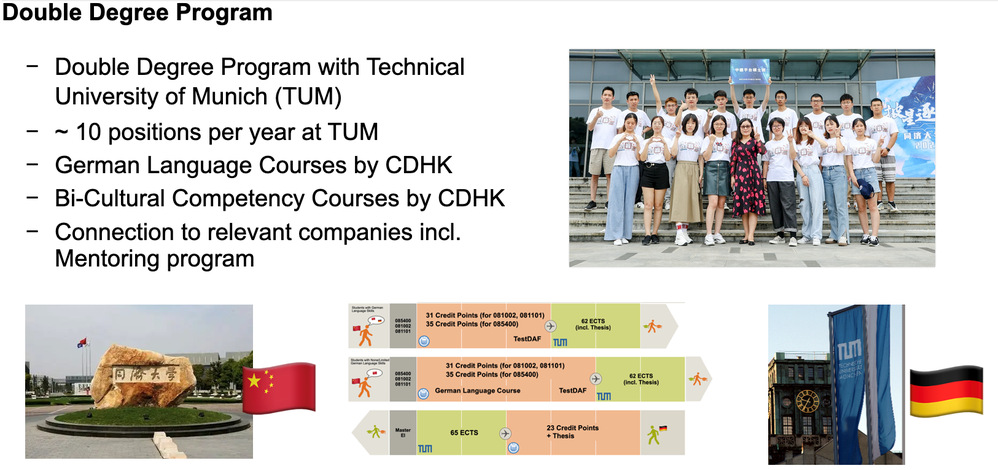-
Zuverlässigkeit und Sicherheit technischer Systeme

TÜV SÜD
ZUVERLÄSSIGKEIT UND SICHERHEIT TECHNISCHER SYSTEME
Prof. Dr. YIN Huilin
-
Kraftfahrzeugsysteme

KRAFTFAHRZEUGSYSTEME
Prof. Dr. ZHU Yuan
Introduction
The Sino-German Research Center for Intelligent Science and Technology (CDFIWT) is the central contact point at Tongji University for Chinese-German research and teaching in the field of Intelligent Systems. The characterising concept is the bilateral nature of the center; it supports Chinese and German researchers and students in their cross-national work. The center offers among others:
• double degree programs (M.Sc.) for Sino-German Education
• Workshops and conferences for Sino-German scientific exchange
• Third-party funded projects for Sino-German research
• Networking with Sino-German companies for talent and technology transfer
The central research focus of the CDFIWT is about Intelligent Autonomous Systems, which are able to interact with humans and the environment in real time. The research focus of the center is therefore formed significantly along the classical controller cycle of such intelligent agents: Sense, Learn, Plan, Act.
Developments in artificial intelligence, mechatronics, electro-nics, materials science, etc. are currently enabling the development of fundamentally new types of machines that – in contrast to earlier times – are increasingly able to act autonomously and perform more and more diverse tasks in increasingly unstructured environments, mostly in direct real-time interaction with humans and the environment. This development is currently taking place in many application areas and size scales, and has the potential to revolutionise previously unattainable size scales (e.g. micro- and nanomachines). Core features of the development are, besides the increasing intelligence and learning ability, also a fundamental expansion of the capability spectrum into areas that were previously inaccessible.
For example, collaboration and networking of an increasingly large number of systems (swarms) or completely novel capabilities (e.g., shape-variant systems) can enable applications that were previously beyond the realm of possibility. In the context of this development, new intelligent and networked machines are emerging, which must be able to perceive their environment, possess their own knowledge and intention, be capable of learning, and ultimately have the ability to transfer this knowledge into goal-oriented actions.
Research directions of the center
Along this spectrum – Sense, Learn, Plan, Act – and the necessary communication with the environment, scientists at the CDFIWT work on various aspects of these research directions. The focus of work at CDFIWT is on the control of intelligent systems, the exchange of information between systems and the environment, and specific aspects of environmental perception.
The central research questions revolve around control and the intelligence inherent in the needed learning and control algorithms. The work covers a wide range along the vertical integration from top-level decision making algorithms to low-level hardware-in- the-loop controllers. Most important application areas of these technologies at CDFIWT are autonomous land-based vehicles and complex industrial factory control and scheduling. In the research projects, the researchers cover, all subareas from theory development and software-based simulation to experimental validation on prototypes.
The second focus of the group is on Communication of mostly mobile systems among each other, especially with the aim to enable the ever increasing requirements on bandwidth of wireless data transmission.
In the area of Perception, researchers are concerned with the further development and performance of computer vision in order to investigate specific questions about the influences on systems for environmental perception, again with the application focus on autonomous driving.
In addition to the described axis along the classical controller cycle, the work at CDFIWT can also be characterised with respect to its development status. According to the classical development phases, research leads to the continuous improvement of existing technologies, the creation of new solutions and the phasing out of old technologies and products. There is a close interplay and interdependence between the discovery of new possibilities (push) and the needs of society and the economy (pull). This technology development usually does not move in a linear fashion and not at a steady pace but often in iterative loops from theory development, experimental considerations and prototyping to product development and market readiness. At CDFIWT, researchers work in all areas of this spectrum. While certain concepts and ideas (e.g. the use of intelligent nano-machines) are still at the transition between theory and experimental research, other researchers at CDFIWT (e.g. in the field of autonomous driving) work closely with companies or are involved in start-ups that develop technology close to market maturity.

You can find further information in the ![]() Researcher Profiles CDFIWT.pdf
Researcher Profiles CDFIWT.pdf
Double Degree Program
The CDFIWT organizes a double degree program (Master of Science) in close cooperation with the Technical University of Munich in the area of elctronic and information engeineering.

More information about CDFIWT >> ![]() CDFIWT..pdf
CDFIWT..pdf
TÜV SÜD
ZUVERLÄSSIGKEIT UND SICHERHEIT TECHNISCHER SYSTEME
Prof. Dr. YIN Huilin
KRAFTFAHRZEUGSYSTEME
Prof. Dr. ZHU Yuan